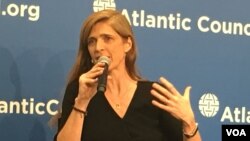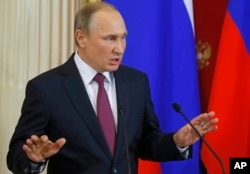In a parting shot to Moscow and a warning to America three days before leaving her post, the U.S. top envoy at the United Nations said Russia is "a major threat facing our great nation."
Ambassador Samantha Power, without naming Donald Trump, chastised the president-elect for casting "doubt on a unanimous, well-documented assessment of our intelligence community that a foreign government is seeking to harm our country."
Her speech to the Atlantic Council came just hours after Russian President Vladimir Putin denied the Kremlin has compromising information on Trump and said those who disseminated a thinly sourced document about the U.S. president-elect were "worse than prostitutes."
Two Republican U.S. senators who spoke with VOA following Putin's comment cautioned against accepting what he says at face value.
"He's an adversary, an enemy of the United States," said majority whip John Cornyn of Texas. "We need to understand that he's not pursuing our interests. He's pursuing Russia's interests."
"We know that leaders commonly deny that which is true but not in their nation's interest to acknowledge," said Bill Cassidy of Louisiana. "Those are the rules of the game. We do not expect anything different [from Putin]."
Emboldening rule-breakers
Power, in her speech, also cautioned that easing punitive actions the Obama administration had taken against Moscow, "when they haven't changed their behavior, would only embolden Russia" and encourage other rule-breakers, such as Iran and North Korea.
The U.S. intelligence community accuses Russia of meddling in the recent election — an action that Power, in her speech Tuesday, said "should worry every American."
Power accused Russia's government of undermining the rules-based international order and said that Moscow for years had taken "one aggressive and destabilizing action after another."
She noted multiple theories about why Russia is taking these actions against the United States and other countries and undermining an international system it helped to build.
"Perhaps it is to regain a sense of its past glory, or to get back at the countries that it blames for the breakup of the Soviet Union, which President Putin has called the greatest geopolitical catastrophe of the 20th century,' " she noted.
Working together
Despite the actions by Moscow and the differences between the United States and Russia, Power said, "It is very much in our interest to try to solve problems with Russia. Dialogue between us is absolutely imperative."
At his final White House briefing, spokesman Josh Earnest noted Power's speech, which happened several hundred meters away, emphasizing her focus on Moscow's consistent comments "that routinely fly in the face of the facts on the ground."
The Obama administration has repeatedly rebutted Russian claims that Moscow is entirely focused on fighting Islamic State in Syria and its continued denials that it has Russians in Ukraine to help separatists undermine the Kyiv government.
"The incoming administration is going to have to decide which side they're going to come down on," Earnest added.
Honeymoon near end?
Trump has faced bipartisan criticism, both before and since his election victory last November, for not criticizing Putin.
Some analysts, however, do not see a long honeymoon between two headstrong leaders.
"I would be very surprised, frankly, if the relationship between Mr. Putin and Mr. Trump is the same in a year or two that we seem to see today," said Michael Green, senior vice president for Asia at the Center for Strategic and International Studies.
At a CSIS discussion Tuesday about foreign policy implications in the Trump administration, the director of the think tank's Europe programs lamented that the president-elect's disparaging comments about the European Union are undercutting a major U.S. foreign policy objective.
"I cannot comprehend why President-elect Trump would place a NATO ally in the same category as an adversary to the United States, President Vladimir Putin," said Heather Conley, a former deputy assistant secretary of state in the Bureau for European and Eurasian Affairs. "Understandably, Europe is very uncertain about the future of U.S. leadership."
VOA’s Michael Bowman and Mary Alice Salinas contributed to this report.






